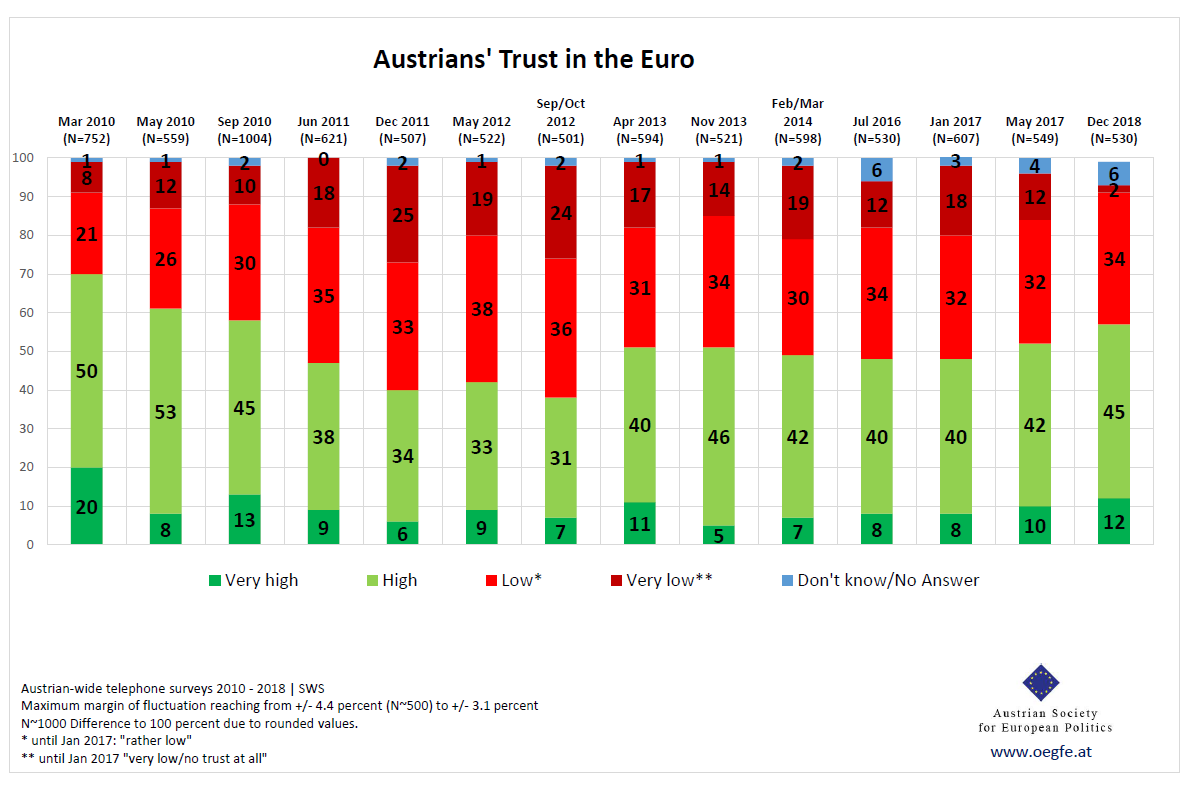20 years after the introduction of the Euro as accounting money in Austria, people’s trust in the common currency is on the rise. Austrians also support deeper cooperation of the countries that are part of the Euro zone, an ÖGfE survey shows.
In the survey conducted across Austria in mid-December, a total of 57 percent of respondents said they had “very large” (12 percent) or “large” (45 percent) trust in the single currency. The number of those who have “low” (34 percent) or “very low” (2 percent) trust in the Euro is 36 percent.
Two-thirds of the respondents are convinced that the Euro will remain as a common currency in the long term. One in five (21 percent) is less optimistic. In six surveys since December 2011, the opinion on this issue has been consistent. Compared to the last survey in January 2017, however, the number of those who do not believe that the Euro will be the common currency in the long term has fallen by 7 percentage points.
A vast majority of respondents (83 percent) believe that the Euro is “very” (35 percent) or “rather important” (48 percent) for the European Union’s position in the world economy. Just over a tenth (12 percent) do not agree with this opinion and say that the euro is “rather not” important in this context. The Euro – compared to January 2017 – has gained slightly in importance for Austrians.
Public opinion is less clear in two other areas: just under two out of three respondents (62 percent) believe that the Euro is “very” (28 percent) or “rather” (34 percent) important for the development of a common European identity. Slightly more than a quarter (27 percent) disagree with this view (“rather not important” (21 percent) or “not important at all” (6 percent). Since January 2017, the number of skeptics has declined by 9 percentage points.
Almost six out of ten respondents (57 percent) say that the Euro is “very” (21 percent) or “rather” (36 percent) important for the further development of the EU. Three out of ten respondents, however, do not agree and state that the Euro is “rather not ” (26 percent) or “not at all” (3 percent) important in this regard. Three surveys since spring 2014 show that the importance of the Euro in this point has slightly decreased.
63 percent agree with the statement that the Euro should be “the common currency of all member states if they fulfill the necessary economic criteria”. Currently, 63 percent agree with this statement. 23 percent oppose an expansion of the euro zone to all EU countries (2017: 20 percent). In contrast, the number of undecided (from 6 to 15 percent) has risen sharply.
Six out of ten respondents (59 percent) argue that Eurozone countries should further deepen their cooperation, while a quarter (24 percent) do not think so (17 percent “don’t know / no answer”).
The current survey was conducted from 10 to 18 December 2018 by the Sozialwissenschaftliche Studiengesellschaft (SWS) on behalf of ÖGfE (Tel SWS 279). 530 persons were questioned via telephone (Austrian population from the age of 16 / weighted according to gender, age and education). Maximum margin of fluctuation approx. +/- 4,3 percent. Difference to 100 percent due to rounded values.






